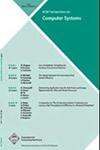双播放:并行顺序日志和重放
IF 2
4区 计算机科学
Q2 COMPUTER SCIENCE, THEORY & METHODS
引用次数: 196
摘要
确定性重放系统记录和再现硬件或软件系统的执行。与单处理器上的重放执行相比,多处理器上的确定性重放很难有效地实现,因为需要重现多线程执行的共享内存操作读取的顺序或值。本文提出了一种在商用多处理器上有效保证重放的新方法——双播放。我们的主要见解是,通过使用额外的执行来并行化应用程序的记录和重播,可以使用更简单、更快的单处理器记录和重播机制,但仍然可以实现多核提供的可伸缩性。双播放在单个处理器上对多个线程进行时间切片,然后在不同的处理器上并发地运行程序的多个时间间隔(epoch)。这种策略(我们称之为单并行性)使日志记录变得更加容易,因为每个epoch在单个处理器上运行(因此epoch中的线程永远不会同时访问相同的内存),并且不同的epoch在不同的内存副本上操作。因此,我们不需要记录共享内存访问的顺序,而只需要记录一个epoch中线程在处理器上被时间切片的顺序。DoublePlay在多个处理器上运行程序的额外执行,以生成检查点,以便epoch并行运行。我们在各种客户端,服务器和科学并行基准上评估双玩;使用备用核,DoublePlay在使用两个工作线程时将日志开销平均降低到15%,在使用四个线程时将日志开销平均降低到28%。本文章由计算机程序翻译,如有差异,请以英文原文为准。
DoublePlay: parallelizing sequential logging and replay
Deterministic replay systems record and reproduce the execution of a hardware or software system. In contrast to replaying execution on uniprocessors, deterministic replay on multiprocessors is very challenging to implement efficiently because of the need to reproduce the order or values read by shared memory operations performed by multiple threads. In this paper, we present DoublePlay, a new way to efficiently guarantee replay on commodity multiprocessors. Our key insight is that one can use the simpler and faster mechanisms of single-processor record and replay, yet still achieve the scalability offered by multiple cores, by using an additional execution to parallelize the record and replay of an application. DoublePlay timeslices multiple threads on a single processor, then runs multiple time intervals (epochs) of the program concurrently on separate processors. This strategy, which we call uniparallelism, makes logging much easier because each epoch runs on a single processor (so threads in an epoch never simultaneously access the same memory) and different epochs operate on different copies of the memory. Thus, rather than logging the order of shared-memory accesses, we need only log the order in which threads in an epoch are timesliced on the processor. DoublePlay runs an additional execution of the program on multiple processors to generate checkpoints so that epochs run in parallel. We evaluate DoublePlay on a variety of client, server, and scientific parallel benchmarks; with spare cores, DoublePlay reduces logging overhead to an average of 15% with two worker threads and 28% with four threads.
求助全文
通过发布文献求助,成功后即可免费获取论文全文。
去求助
来源期刊

ACM Transactions on Computer Systems
工程技术-计算机:理论方法
CiteScore
4.00
自引率
0.00%
发文量
7
审稿时长
1 months
期刊介绍:
ACM Transactions on Computer Systems (TOCS) presents research and development results on the design, implementation, analysis, evaluation, and use of computer systems and systems software. The term "computer systems" is interpreted broadly and includes operating systems, systems architecture and hardware, distributed systems, optimizing compilers, and the interaction between systems and computer networks. Articles appearing in TOCS will tend either to present new techniques and concepts, or to report on experiences and experiments with actual systems. Insights useful to system designers, builders, and users will be emphasized.
TOCS publishes research and technical papers, both short and long. It includes technical correspondence to permit commentary on technical topics and on previously published papers.
 求助内容:
求助内容: 应助结果提醒方式:
应助结果提醒方式:


